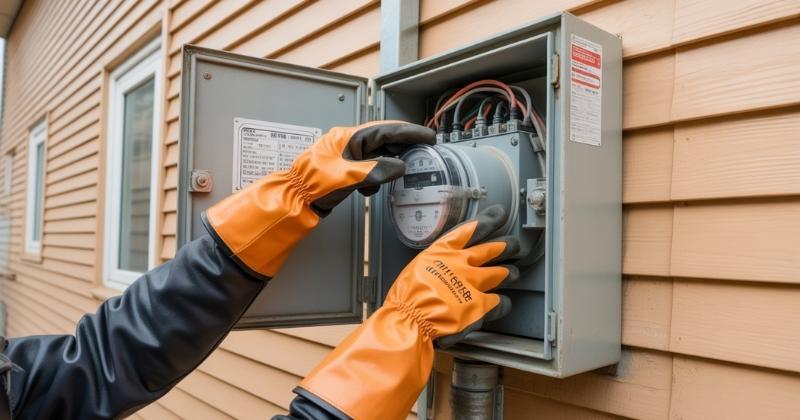
Eskom has issued a strong warning to South Africans, stating that tampering with electricity meters is a criminal offence that will bring about serious and unavoidable consequences for those involved. The utility has emphasised that this form of interference is not a minor matter but a deliberate act that can result in heavy fines, legal prosecution, and long-term damage to both individuals and the broader electricity supply system.
Key Takeaways
- Meter Tampering is a Criminal Offence: Interfering with electricity meters is classified as a crime in South Africa, carrying fines of up to R12 000 and the risk of prosecution. Offenders may also face long-term consequences such as criminal records that affect employment and financial opportunities.
- Massive Financial Losses for Eskom and Municipalities: Illegal tampering, theft, and vandalism drain hundreds of millions of rand from the electricity sector each year. This lost revenue reduces Eskom’s ability to fund maintenance, strengthen the grid, and provide reliable power to paying customers.
- Severe Safety Hazards Linked to Tampering: Altered meters can fail to detect electrical faults, creating risks of fire, electrocution, and extensive property damage. These dangers extend beyond the tampering household, threatening neighbours and entire communities.
About Arcadia Finance
Apply with ease through Arcadia Finance. No application fees, 19 trusted NCR-registered lenders, and a quick, transparent process made for your needs.
Rising Incidents of Meter Interference
The warning comes in response to a significant increase in reported cases during 2025, where electricity meters have been deliberately altered, bypassed, or illegally modified in attempts to avoid paying for electricity usage. Eskom has noted with concern that these incidents are becoming more widespread, creating a growing problem that is straining its resources. In some communities, Eskom has reported clusters of tampering cases that suggest organised syndicates are involved, with technicians finding multiple homes on the same street using fraudulent methods to cut electricity costs.
Eskom has explained that tampering with a meter to reduce or stop its recorded readings directly undermines the company’s already stretched financial position. At the same time, it increases risks to public safety by creating potential hazards within households and businesses. Faulty or compromised meters can lead to unsafe electrical conditions, exposing people and property to danger.
Officials have warned that these dangers are not hypothetical, pointing to past incidents where tampered meters sparked electrical fires that destroyed family homes, leaving households displaced and causing millions of rands in damages.
Support from Local Authorities
The City of Ekurhuleni has joined Eskom in condemning illegal practices such as unauthorised connections, ghost vending, and the deliberate bypassing of electricity meters. The city has expressed its concern that these actions do not only affect Eskom but also place severe pressure on municipal utilities that rely on stable revenue collection to provide essential services. Ekurhuleni has also pointed out that tampering reduces the funds available for infrastructure upgrades, meaning honest-paying customers face service delays and weaker systems as a direct result of criminal activity.

How Meter Tampering Occurs
Authorities have clarified that meter tampering usually happens when a customer physically interferes with the device, preventing it from registering the correct amount of electricity consumed. In some cases, the meter is stopped entirely, while in others it is adjusted to reflect much lower usage than what is actually consumed. This manipulation disrupts billing accuracy and ultimately undermines service delivery.
Eskom’s technicians have described methods such as inserting foreign objects into meters, rewiring connections, or installing bypass cables, all of which create highly unsafe electrical networks that could collapse at any moment.
The City of Ekurhuleni has warned that such behaviour compromises the financial stability of municipal utilities, disrupts service reliability for honest paying customers, and places unnecessary strain on public resources. It further noted that this illegal practice has broader economic consequences, undermining the ability of both local and national authorities to maintain infrastructure and stimulate economic growth. Experts have argued that meter tampering acts as a hidden tax on law-abiding citizens, who ultimately shoulder the burden through higher tariffs needed to cover the revenue lost to fraud.
Penalties Imposed by the Metro
To discourage offenders, the metro has introduced strict penalties for those caught tampering. These penalties include costs for the removal and reinstatement of service connections, which are calculated based on labour, transport, and materials used, with an additional charge of ten percent applied. The minimum charge imposed on offenders is currently set at R5,566.07, making it a substantial financial burden for anyone found guilty of tampering.
City officials have explained that these charges are deliberately set at a level that will serve as a deterrent, as the damage caused by tampering often exceeds the cost of normal consumption.
Eskom’s Own Enforcement Efforts
Eskom has reiterated its stance by stressing that anyone who tampers with electricity meters will face serious consequences, including hefty fines and potential criminal charges. The utility monitors consumption patterns closely to detect irregularities and has invested in systems that allow it to identify abnormal usage quickly. If discrepancies are found, technicians are dispatched to audit the meters on-site. The utility has also begun using advanced digital monitoring tools, including artificial intelligence software, to compare usage patterns across households and flag suspicious activity in real time.
Detection of Fraudulent Activity
The utility has explained that cases of fraud are often uncovered when a household shows signs of electricity usage without purchasing power, or when purchases are significantly lower than what the property should normally consume. Such situations strongly indicate either tampering or the use of illegal prepaid vouchers sourced from crime syndicates. Eskom treats these cases with urgency, and when tampering is confirmed, it has the authority to remove its infrastructure entirely and pursue criminal charges against the offenders.
In some cases, law enforcement agencies are also called in, as tampering often forms part of a larger network of organised crime that extends beyond electricity theft.
Hidden Dangers to Safety
Beyond financial losses, Eskom has warned of the serious dangers linked to tampering with meters. Once a device has been illegally altered, the system can no longer reliably detect faults within a household or business. This means that electrical faults may continue unnoticed, as the system will fail to trip and cut off the supply. Such conditions greatly increase the risk of electrocution, electrical fires, and severe property damage.
Eskom has cautioned that these risks extend to neighbours and nearby structures, since fires or surges caused by a tampered meter can spread beyond the property of the offender.
Warnings Against Scams
The utility has also urged customers not to fall victim to scams. Criminal groups and individuals often approach households offering to alter meters in exchange for payment. Eskom has made it clear that such offers are fraudulent and illegal, and any participation in them will expose households to criminal liability in addition to the risk of faulty infrastructure. The company has urged South Africans to report these scams immediately, as some fraudsters disguise themselves as Eskom technicians, tricking unsuspecting households into granting access to their electrical systems.

Escalating Costs of Vandalism and Theft
The crackdown on tampering comes at a time when Eskom is already dealing with substantial costs caused by vandalism and theft of its infrastructure. Between April 2024 and February 2025, the utility recorded financial losses of around R221 million as a direct result of these crimes. While this represents a decrease compared to the R271 million lost during the same period the previous year, Eskom has stressed that the issue remains extremely severe and continues to drain its resources. Officials have explained that money lost to theft and tampering could otherwise have been invested into stabilising the grid, reducing load-shedding, and improving maintenance schedules.
Penalties and Prosecution for Offenders
To deter offenders, Eskom has confirmed that fines of up to R12,000 may be imposed on those found guilty of tampering, with repeat offences resulting in criminal prosecution. Customers are strongly encouraged to regularise their accounts during grace periods offered by the utility, as failure to do so will lead to penalties and potential disconnection.
In addition, convicted offenders may find themselves with a criminal record that could affect employment opportunities, travel prospects, and financial applications in the future.

Call for Community Support
Monde Bala, Eskom’s group executive for distribution, has appealed to communities to take a proactive role in protecting the infrastructure that delivers electricity to their homes and businesses. He explained that reliable access to electricity is essential for preserving food, preparing meals, heating households, providing lighting, and ensuring that children are able to study after dark. Bala emphasised that safeguarding infrastructure is not only Eskom’s responsibility but a duty shared by communities across the country. He further warned that community tolerance of tampering creates an environment in which such behaviour flourishes, stressing that silence and inaction indirectly support criminal activity.
Consequences of Vandalism
Bala further explained that vandalism and theft of electricity infrastructure often lead to unplanned power outages, which can leave households and businesses without electricity for extended periods. In cases where essential equipment, such as high-voltage components or transformers, is damaged, restoring power can take several weeks. This delay is largely because replacement parts are not always available immediately, causing prolonged hardship for communities dependent on consistent electricity supply. Such delays also increase costs for Eskom, as urgent imports of specialised equipment often have to be arranged at premium prices, draining the company’s budget even further.
Conclusion
Eskom’s warning highlights the seriousness of electricity meter tampering, both as a criminal act and as a dangerous threat to public safety and service delivery. With millions of rand lost each year and communities left vulnerable to fires, blackouts, and infrastructure collapse, the utility and municipalities are stepping up enforcement with penalties, prosecutions, and community outreach. The message is clear: tampering not only harms Eskom but also undermines the economy, threatens lives, and places law-abiding citizens at a disadvantage, making it a collective responsibility to protect South Africa’s electricity infrastructure.
Fast, uncomplicated, and trustworthy loan comparisons
At Arcadia Finance, you can compare loan offers from multiple lenders with no obligation and free of charge. Get a clear overview of your options and choose the best deal for you.
Fill out our form today to easily compare interest rates from 19 banks and find the right loan for you.

